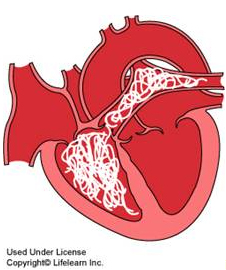
When they bite, mosquitoes can transmit heartworm infection. And those heartworms can wreak havoc on your dog or cat. These parasites can severely and sometimes fatally damage the heart, lungs, and blood vessels. Some pets may not show any signs of infection; in those that do, symptoms can vary widely.
In dogs, signs of heartworm disease can range from coughing, fatigue, and weight loss to difficulty breathing and a swollen abdomen (caused by fluid accumulation from heart failure). Canine heartworm infection can also lead to a life-threatening complication called “caval syndrome” (a form of liver failure); without prompt surgical intervention, this condition usually causes death.
Although often thought to not be susceptible to heartworm infection, cats can indeed get heartworms. Cats can suffer from a syndrome referred to as heartworm-associated respiratory disease (HARD); the symptoms can be subtle and may mimic those of asthma or allergic bronchitis. Signs of respiratory distress, such as rapid or difficult breathing, wheezing, and panting, are common. Other symptoms include coughing, vomiting (typically unrelated to eating), and loss of appetite or weight. Heartworm infection is more difficult to diagnose in cats than it is in dogs.
Treatment for heartworm infection is far more expensive than prevention—and it can actually kill your dog. There is no approved treatment for cats. Some cats spontaneously rid themselves of the infection; others might not survive it. And even one or two adult heartworms in a cat can cause serious problems.
Fortunately, there’s an easy way to keep your dog or cat safe: by administering monthly heartworm preventives. Most heartworm medications also protect your pet against other parasites, such as roundworms, hookworms, whipworms, ear mites, fleas, and ticks. We can recommend the best regimen of prevention for your pet.
